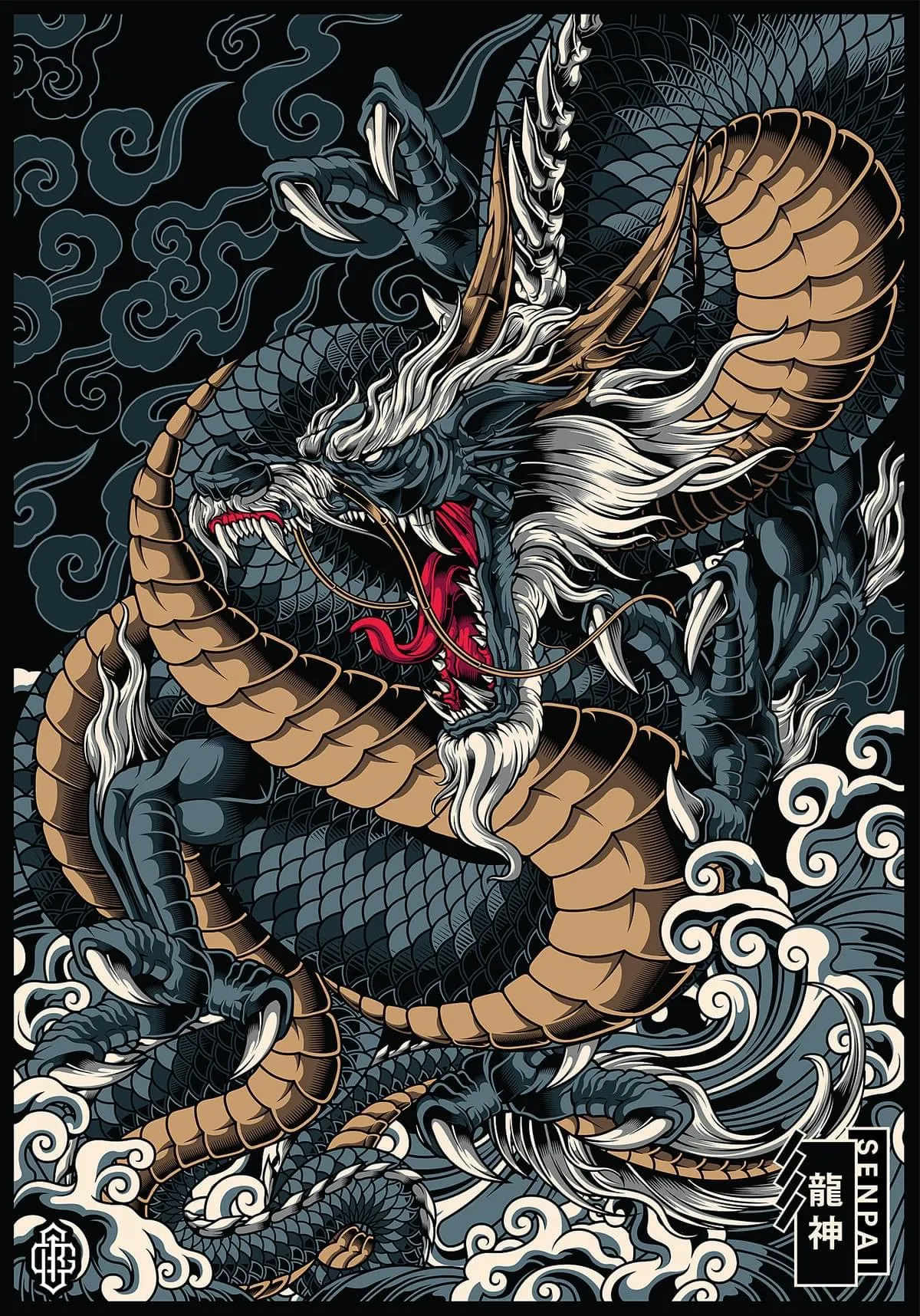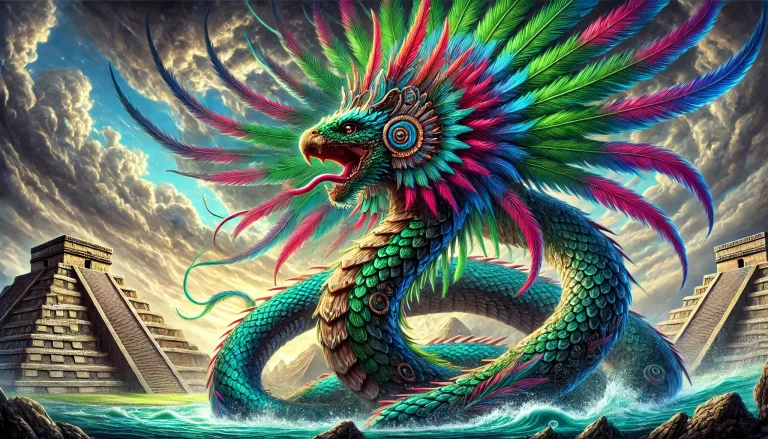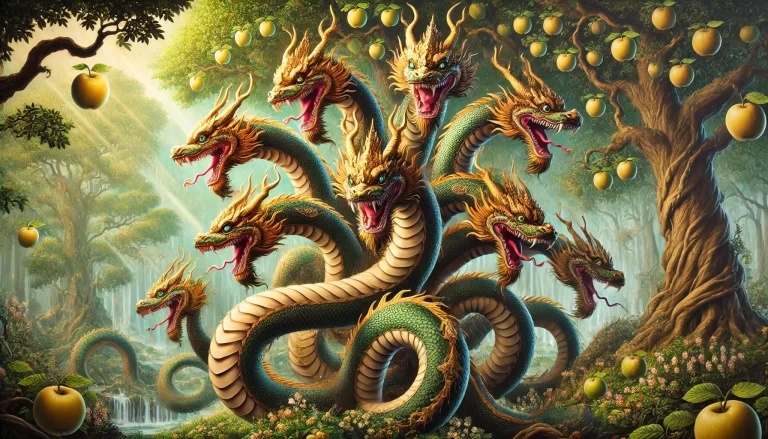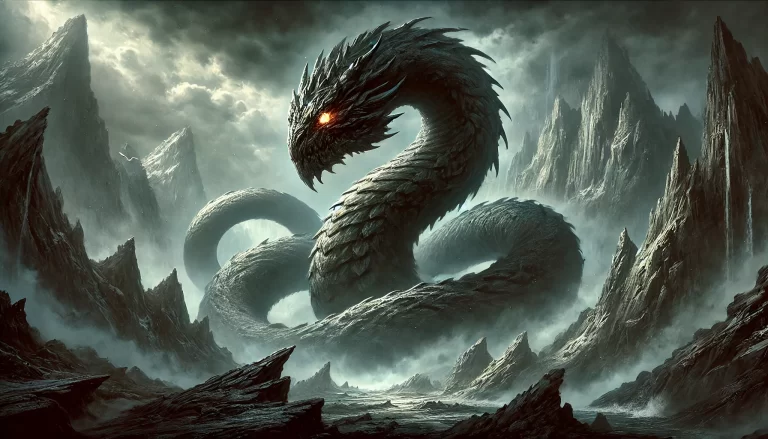Ryujin: The Dragon King of Japanese Mythology

In the rich tapestry of Japanese mythology, Ryujin stands out as a powerful and revered figure. Known as the Dragon King, Ryujin rules the seas and is often associated with the forces of nature, particularly water. As the deity of the ocean, he is both feared and respected by humans, seafarers, and other creatures alike. His influence over the seas not only highlights his dominion over nature but also his integral role in Japanese culture and folklore.
The Legend of Ryujin
Ryujin, sometimes referred to as “Watatsumi” or “Owatatsumi,” resides in an opulent undersea palace known as Ryugu-jo. This magnificent palace is described in legends as a shimmering coral castle, teeming with sea creatures who serve the Dragon King. Ryujin is depicted as an imposing dragon, a form that reflects the Japanese belief that dragons are protective yet fearsome beings. His dragon form also emphasizes his connection to the natural forces, embodying both the beauty and danger of the ocean.
Ryujin’s kingdom is said to stretch across the vast underwater world, giving him control over the tides and storms. In many stories, his power is so great that he can manipulate the weather and summon tsunamis at will, making him a key figure in ancient tales of maritime journeys and natural disasters.
Ryujin and Japanese Emperors
Ryujin’s influence reaches far beyond the ocean itself. According to myth, he was an ancestor of the first Emperor of Japan, Emperor Jimmu. This connection to the imperial family not only elevated Ryujin’s status but also symbolized the divine nature of Japan’s rulers, who were thought to have descended from the gods.
The legendary tale of Princess Toyotama, Ryujin’s daughter, further entwines the Dragon King with the imperial lineage. Toyotama marries a human prince, giving birth to a child who becomes the ancestor of Japan’s emperors. This mythological union between the dragon god and humans represents a merging of the natural and human worlds, highlighting Ryujin’s importance in shaping Japan’s history.
Ryujin’s Role in Japanese Culture
As a protector of the seas, Ryujin was often invoked by fishermen and sailors seeking safe passage across treacherous waters. Offerings were made to appease the Dragon King, hoping to gain his favor for calm seas and abundant fishing.
Ryujin is also associated with magical jewels known as tide-controlling gems (Kanju and Manju). These jewels have the ability to control the ebb and flow of the tides, symbolizing Ryujin’s absolute power over the oceans. In many stories, these gems are given to human heroes who demonstrate their bravery or worthiness, offering them control over natural forces as a reward.
The Ryugu-jo Palace and the Tale of Urashima Taro
One of the most famous tales involving Ryujin is the legend of Urashima Taro. In this story, a young fisherman named Urashima rescues a turtle, which turns out to be a servant of Ryujin. In gratitude, the turtle brings Urashima to Ryugu-jo, the Dragon King’s palace, where he is entertained by Ryujin’s daughter, Otohime. The palace is depicted as a dazzling place filled with wonders, where time passes differently. Though Urashima stays only a few days in the palace, he finds upon his return to the surface world that many years have passed, and everything he once knew is gone.
This story, with its themes of time and transformation, underscores the mystical and sometimes perilous nature of Ryujin’s domain, where human understanding of reality is challenged by the god’s immense power.
Ryujin in Modern Japan
Even today, Ryujin’s legacy continues to influence Japanese culture. He is honored in various festivals, and his image can be seen in art, temples, and shrines dedicated to water deities. Ryujin’s protective nature is often called upon in ceremonies related to maritime safety and prosperity, reflecting the ongoing respect for the sea and its ruler in Japanese life.
Ryujin’s place in mythology reminds us of the enduring relationship between humans and nature, and the reverence ancient cultures held for the forces beyond their control. As the Dragon King, Ryujin represents both the awe and the danger of the ocean, a reminder of the beauty and unpredictability of the natural world.
Conclusion
Ryujin’s mythology is deeply embedded in the cultural and spiritual landscape of Japan. His stories transcend the boundaries of time, symbolizing both power and protection. As the god of the sea and an ancestor of the imperial family, Ryujin holds a place of great significance in Japanese mythology. His tales continue to captivate and inspire, offering a glimpse into the complex relationship between the divine, the natural world, and humanity.






